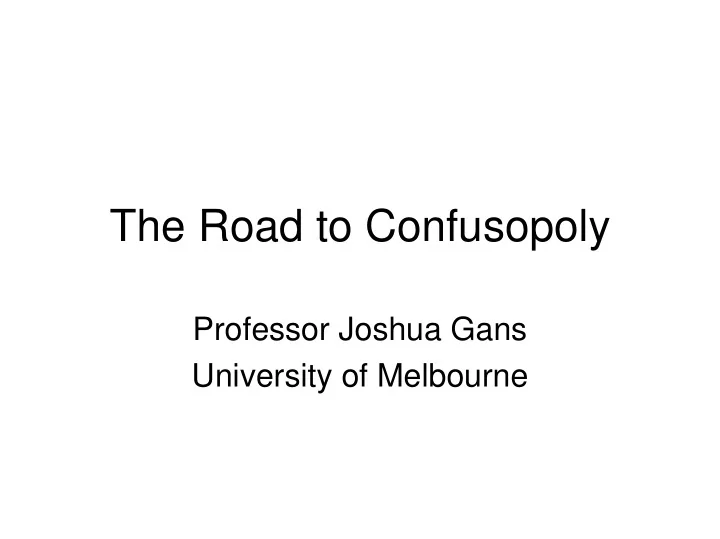

The Road to Confusopoly Professor Joshua Gans University of Melbourne
Confusopoly • Adams: “a group of companies with similar products who intentionally confuse customers instead of competing on price.” • Examples: telecommunications, insurance, mortgages, credit cards, etc. • But what about energy retailing?
Search Model • Consider an industry with several producers of an homogenous product • A consumer considering switching suppliers will switch if: P old + D > P new – where D are switching costs including any disconnection fees • A consumer will only search for a new supplier if: Prob[ P old + D > P new ] > S – where S are search costs
Diamond Paradox • With many suppliers, why would you expect to get a better deal? – If all highly competitive, then can’t do better – Only if you think firms will offer you a customer specific deal; but will they? • According to Diamond (1971): each firm won’t lose many customers by charging a slightly higher price than other firms – In equilibrium: all charge the monopoly price and no search occurs.
‘Sleepy Incumbent’ Model • Customers may expect to get a better deal if switching from an incumbent – Implication: entrant’s should advertise pricing deals – Incumbent may accommodate this by charging higher prices (Guilietti, Waddams- Price, Waterson, 2005) • Should see incumbent retailers charge a higher price than entrants in an area
Which Model? Sample of One • Which model applies in Victoria? Diamond Paradox or Sleepy Incumbent • With this in mind, I decided to revisit my own gas retailing choice in Victoria – I was aware I had choices – I had never researched options before – I utilised the Essential Services Commission Energy Comparator
Behavioural Economics • New economic approaches for dealing with consumer irrationality • Basic idea: – When faced with an upfront cost and future options, consumers with over-weight option value and spend too much upfront – When faced with an upfront benefits and future avoidable costs, consumers will under- weight ability avoid costs and spend too little upfront
Implications for Switching • Consumers will under-weight importance of disconnection fees • Consumers will under-weight ability to opt out of automated payments to switch in the future • Consumers will under-weight future switching costs • Consumers will fail to invest in information to make choices transparent – And firms will not have an incentive to provide transparency as consumers will demand more upfront to compensate for switching costs later on.
Policy Responses? • Likelihood of consumer choice providing a locus for effective competition is bleak – Energy retailing looks like a confusopoly • Would a regulated pricing structure that forced simplicity and transparency be better? • Would a consumer choice regime that required a choice be effective? – E.g., an audit of individual choices or an annual auction for customers?
Recommend
More recommend